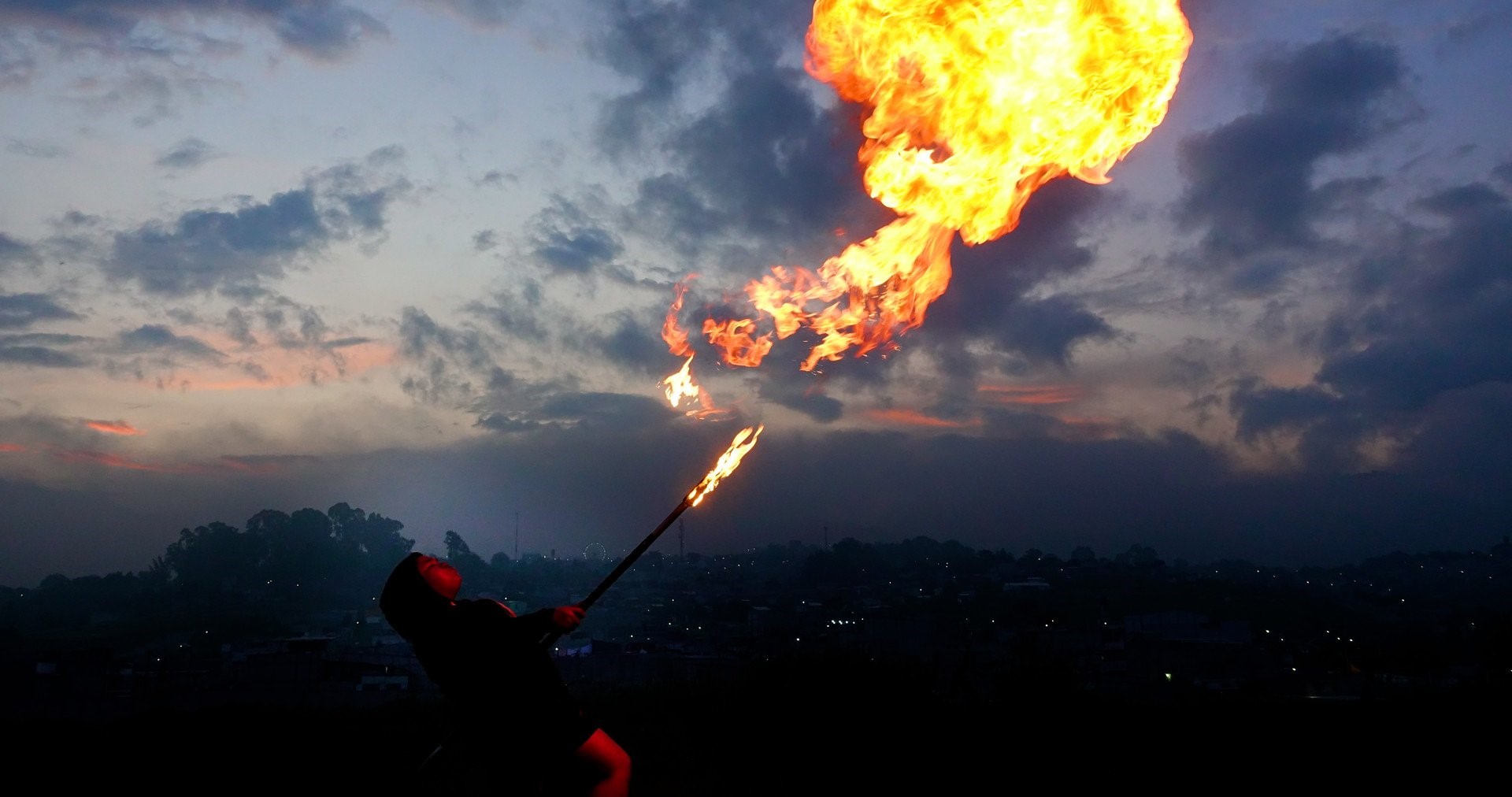“It was not the fire that killed them, but the state.”
Even protests are dangerous in Guatemala, people disappear for less. In ‘Comparsa’, directors Curtis and Anderson follow the proactive moves of a group of girls and women, who are determined to be heard, in their innovative way, as they protest about the egregious lack of punishment for the perpetrators of heinous crimes against women in Guatemala.
These activities came in the aftermath of an horrific event, that saw 41 young teenagers burned to death in a Guatemalan state-run ‘Safe Home'. 56 desperate teenage girls who had tried to escape the repeated rapes and abuses that took place in the Home, were rounded up by the police and locked in a school room. When it caught fire, the police refused to open the door and 41 young women perished in the blaze, with only 15 survivors.
That state-run ‘SAFE HOME’ had turned out to be anything but! Despite this terrible tragedy being covered by numerous media outlets, the government refused to act.
To the shame of the authorities, the perpetrators of this appalling crime were never held to account to date, and girls continue to vanish on a regular basis, only to be found dead, having been visibly tortured. It is said that Guatemala holds the unenvious position of being one of the worst country in the world for sexual crimes against women and girls. Normal protestors risk simply adding themselves to the horrific statistics. Yet, despite this, groups still try to congregate and protest, demanding punishment for the perpetrators, but nothing has yet been done.

Moved to act on the fifth anniversary of the terrible fire, to share their testimonies in solidarity, two sisters, (who themselves endured horrific violence in their own home from a person who was a part of the family), decide to find a new way to convey this vital message to the world and to the authorities, using art and circus skills. They were particularly affected as they had lost a close friend from their childhood, who had, unfortunately, ended up at the home. They decide to create the First Women’s Festival. Despite having limited means, living with their mother and siblings in a one- room tin dwelling, these intrepid sisters galvanize the community to act and participate in their venture.
Lesli Canela Pérez (22) and her younger sister Lupe Pérez, live in Peronia. Lesli, in particular, is a prime mover, she rallies a group to help to fix up a derelict plot of land used for rubbish and dead cats to create a safe park for children to play. This determination to avoid being powerless victims, leads Lesli and Lupe to join an artistic group, ‘Peronia Adolescente’ led by the charismatic Marta Chicoj García. It has become the local grassroots art organization where the sisters and their colleagues organized the Comparsa. This creative space, created by Marta and her collegaues, itself took over 25 years to be established against all odds. There the group work with paint and papier-mâché, music, ideas and even some improvised meditation.
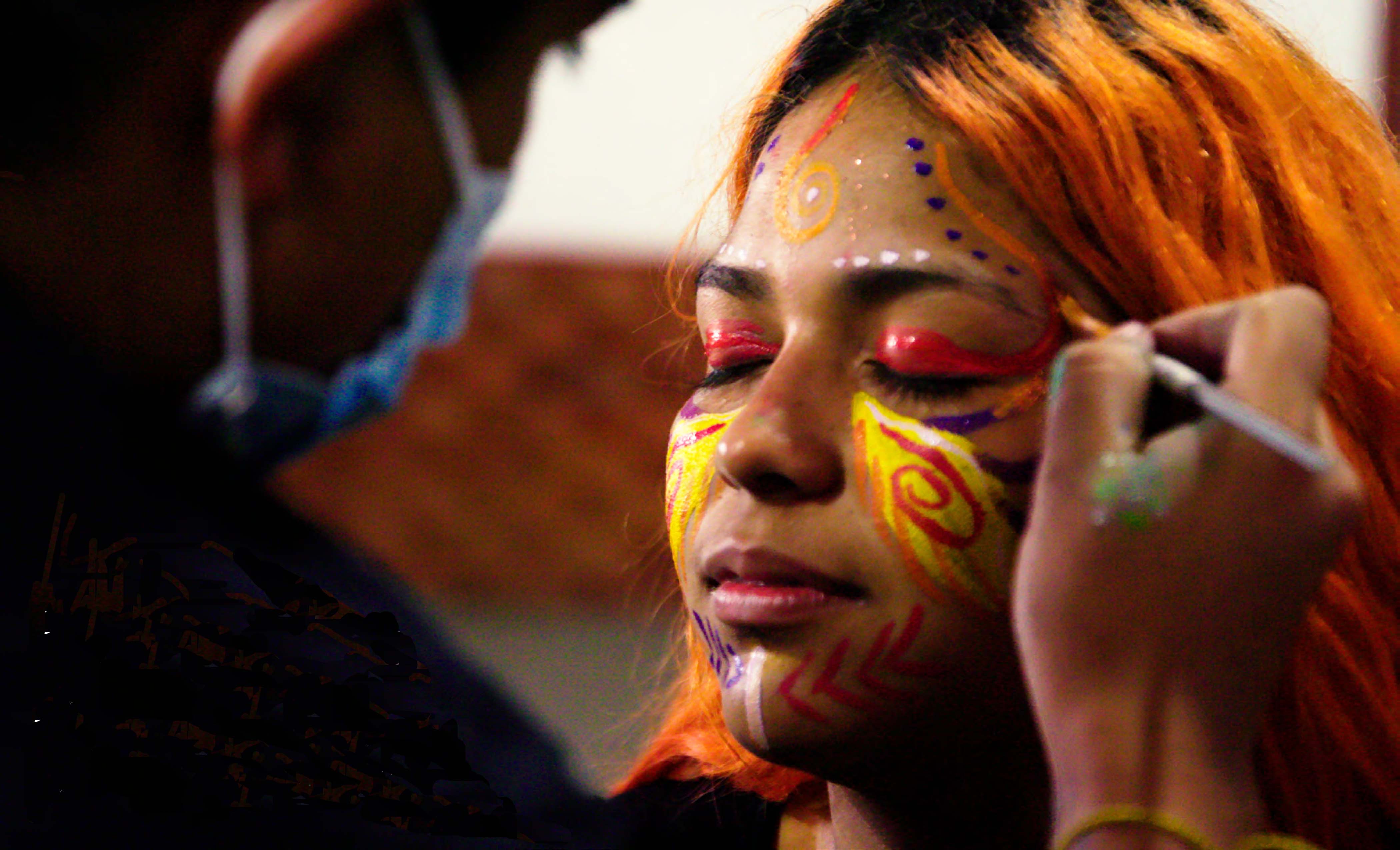
Using various art forms, this group or ‘tribe of women’ leads to the inspired idea to create a women’s festival in Peronia: a music and artistic festival of protest, in the hopes that the message will finally get through with fewer violent repercussions. Marta with the women sing a song written by Vivir Quintana (Canción sin Miedo) to the guitar played by Dalila Agustín Quevedo: -
“May the state tremble. The heavens the streets,
Judges and cops beware, today peace is taken from women, they instilled fear
We grew wings every minute of every week
Friends are stolen, sisters are killed, they tear at our bodies, make them disappear
Please, remember their names ♫”
Lesli, who is a circus artist, practices playing with her fire rods and fire breathing while her sister works on the body painting and impressive visuals. Over a period during which the frequent disappearances continue, they work towards their goal.
“If this government does not let us dream, we will not let them sleep!”
Lesli: “There are things we cannot talk about or all of us would be at risk, my family and my friends. It’s scary. I was abducted once and am unable to talk about it. I have a protective instinct. [Now] I realize I have power to speak through art. … (weeping) It is hard to be a girl. If I get the chance to speak, I will no longer be silent. They doubted if someone was really hurting us, and made us feel we were to blame, because my mother had no idea. We could not tell her and we lived in fear, as we tried to cope on our own.”
With other members of the group, Lesli works with the lyrics of a protest song, and on techniques to walk and dance on stilts, no mean feat! It is to be the first neighbourhood festival, a ‘comparsa’. A celebration of freedom through art, with large puppets, marionettes and floats, a festival against violence, and the group clearly cherish their rules: respect, tolerance and responsibility.
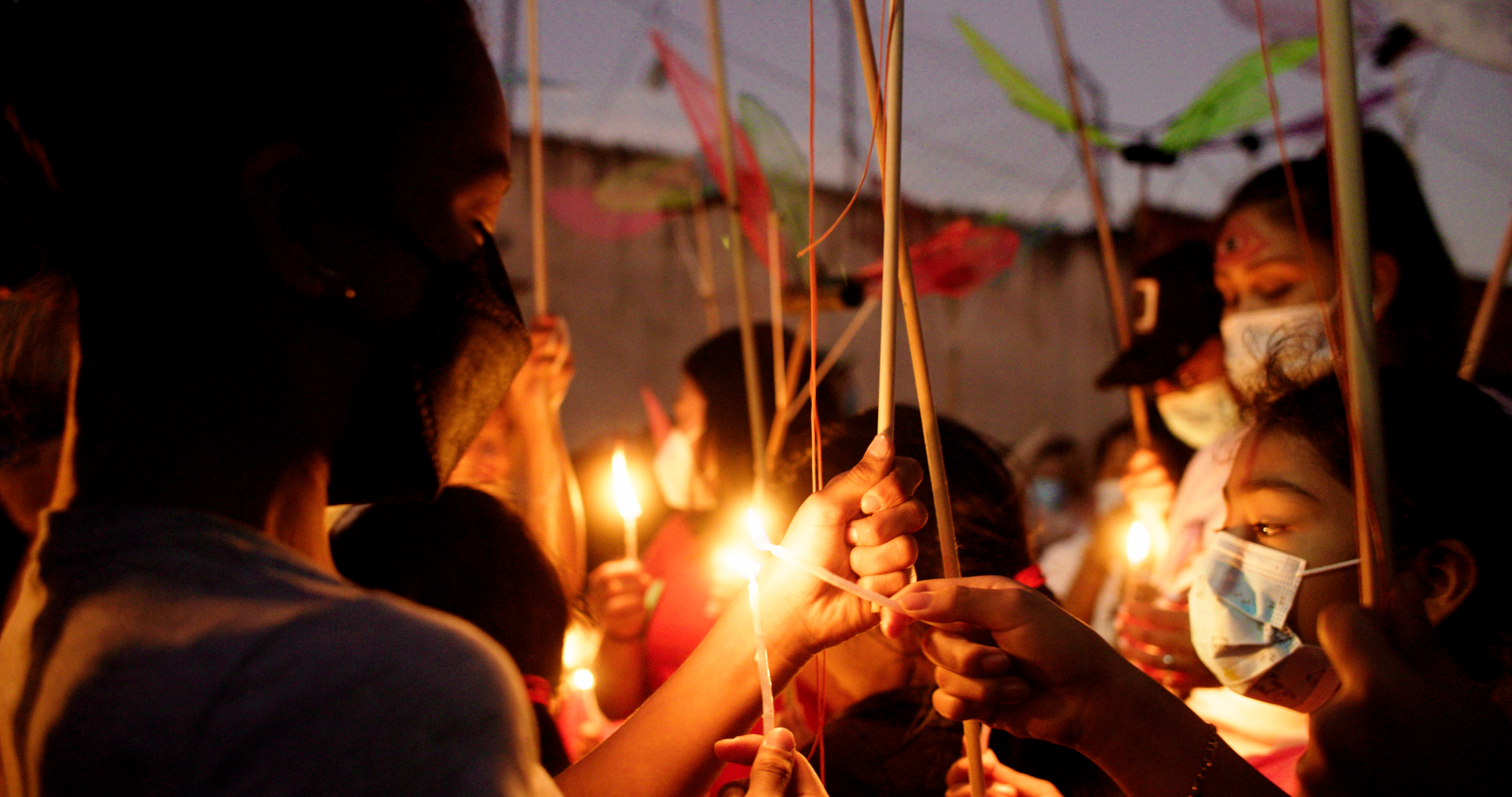
Lesli and her sister Lupe shine at every turn, exuding confidence and talent and an infectious warmth and likeability. The whole creativity of the group, despite such minimum means, is astounding and the girls prepare banners with the names of the dead girls, paint the puppets and the bodies of the participants and practice their drum playing. The effort is phenomenal echoed in the wall of photos of the unpunished perpetrators with their faces masked.
The directors’ strategy was to follow the progress made by the girls as they rallied help from everyone to get the festival on the road, literally. Being a feature-length documentary however, it feels it has struggled to keep up the momentum. There are few surprises to be had in this kind of story and within the first 30 minutes we understand how it will work out, so it feels like if might have benefited from some sharper editing to avoid repetition.
This film has gathered a multi-talented crew. Director Vickie Curtis has been known for her writing, winning the primetime Emmy award for non- fiction writing for Netflix ‘s Original “The Social Dilemma”. This is her directorial debut. Doug Anderson, the co- director, has a reputation as a superb sound recordist, director and producer. With his partner Sophie Luo, they have produced and directed a number of productions on social justice themes. Not to be forgotten is the editor Carolina Siraqyan, who worked on two Oscar nominated features, including the Mole Agent and The Eternal Memory.
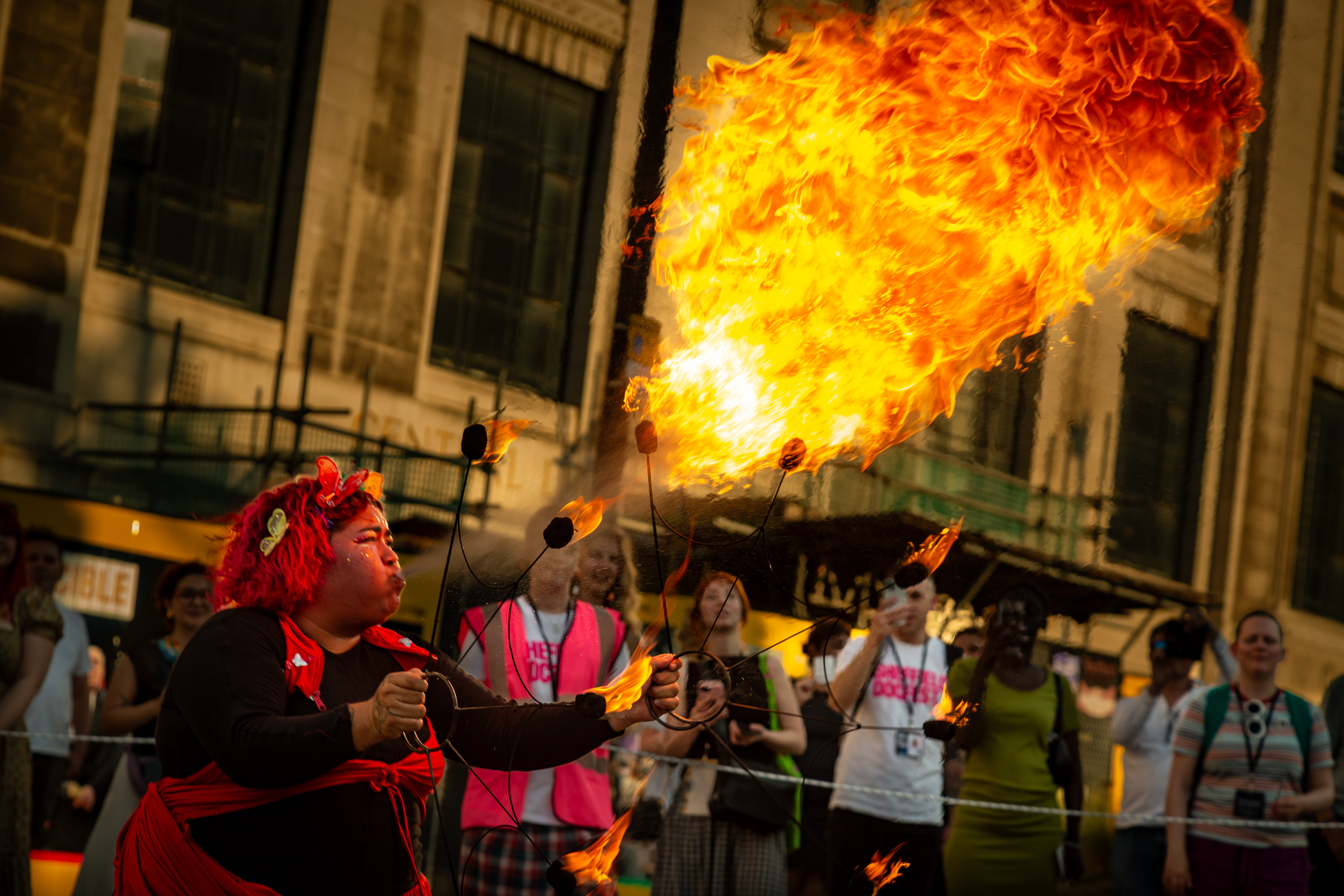
Lesli lights up Sheffield at the festival
This issue is so profound however, that although I personally am not fond of films with a “message,” it is clear that this issue needs to be further explored and the authorities have to start acting, at the very least, with suitable punishments for the rapists and murderers. There are signs this might be happening. As the women continue to seek justice for their dead friends:
“Because we all want a world with freedom”.
Their work continues as they use street theatre to foment a joyful movement using music, art, colour and puppets to help heal the community. A powerful example of their joyous circus style procession took place before the premiere in Sheffield. literally setting it all alight!
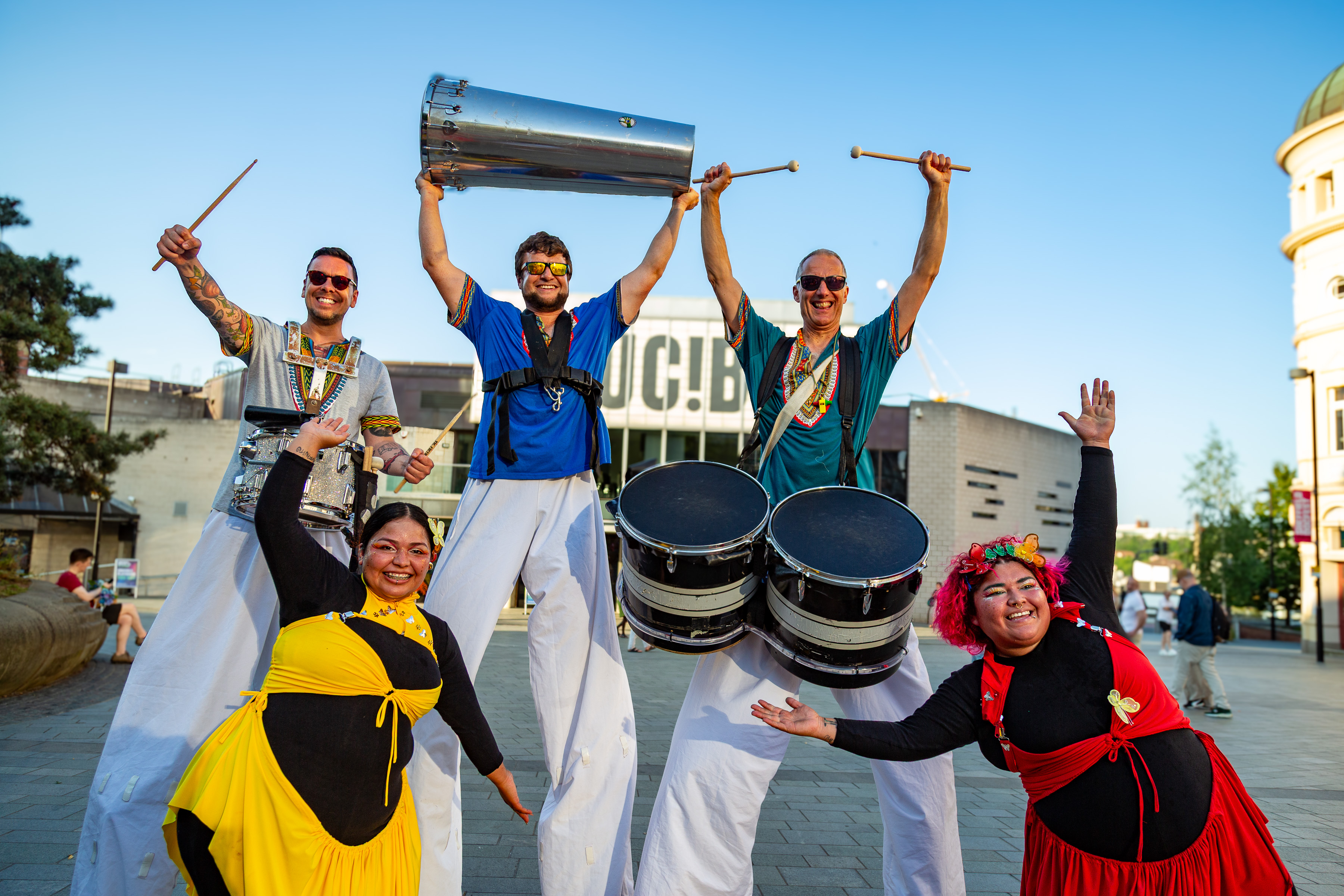
The Guatemalan Comparsa in Sheffield UK! ( photo by Edgar Tuy)
COMPARSA (2025) DIRECTED BY Vickie Curtis and Doug Anderson
World Premiere with Q & A at the 2025 Sheffield Doc Fest on Saturday June 21st 2025 at 20:45
Sunday June 22nd at 12:45.
(https://www.sheffdocfest.com/film/comparsa)
DOP: & Spanish-American Sebastián Lasaosa Rogers & Edgar Tuy, a Kaqchikel Mayan film maker / Producers: Olivia Ahnemann, Anna Hadingham, Vickie Curtis & Doug Anderson /Co-producers: Lesli Canela Pérez & Lupe Pérez / Executive Producers: Jayro Bustamante, & Jeff Orlowski-Yang / Music- Composer: Mark Crawford / Editors: Carolina Siraqyan, Javiera Velozo & Doug Anderson / Sound: Andrés Marthe MPSE /


